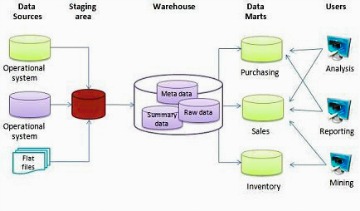Data usage has increased drastically over the past few years. It can be attributed to the fact that smartphones and other tech gadgets have become more affordable (thanks to competition) and almost everyone can afford to have one. And as such, data consumption increases leading to data storage and security issues. Furthermore, more people are hooked on social media whether for business or leisure, so most transactions are being done online leading to a surplus of data.
 Millions to billions of data used daily require massive data warehouses that will analyze and store data among others. And as cloud computing continues to gain popularity, data warehouses also start to utilize it as they collate and analyze data in aid of the business decision-making process.
Millions to billions of data used daily require massive data warehouses that will analyze and store data among others. And as cloud computing continues to gain popularity, data warehouses also start to utilize it as they collate and analyze data in aid of the business decision-making process.
Another speaker also noted another set of challenges that arise from trying to store everything in one place. Asset managers should have a clear definition between the middle- and back-office data and the front-office analytical data, which he called “less mission-critical”.
He added that data warehouses should be built to support the business in the future, with capabilities to encompass new products or programmes, and this requires some internal overheads.
While the data in the warehouse should be a “golden source”, the speaker noted that, in the case of a discrepancy, data must be fixed at its source, and not in the warehouse, otherwise the business will end up with inherent quality issues.
He concluded that a data warehouse can provide operational efficiency and flexibility, offering the ability for asset managers to “report off of something that you would inherently want to”.
(Via: http://www.assetservicingtimes.com/assetservicesnews/article.php?article_id=7283)
While it is of little use to most small to medium enterprises, data warehousing is a helpful and necessary aspect of big businesses whose operation has gone global. And this market is seeing impressionable growth and is expected to keep its momentum in the next ten years.
With the increasing need of data management, more enterprises are investing in data warehousing solutions to gain better insights about their business. These solutions integrate and analyse business data using historical and real-time data, enabling executives to make better decisions based on accurate understanding. Data warehousing solutions coupled with business intelligence tools help enterprises implement efficient business analytics. This data can be accessed by users across the organization using ad hoc SQL queries, periodic reports and dashboards. Even though data warehousing is beneficial for the business, but it can be complex to set up and involves investments even after set up to prevent loss of data. Moreover, recent trends involving huge volumes of data are obstructing the performance of data warehouse systems.
But problems are inevitable, but can be recovered from (https://www.harddrivefailurerecovery.net/hard-drive-recovery/) as businesses continue to grow and the demand for data increases without compromising the quality of the data that is analyzed.
Large enterprise customers have made huge investments in data warehousing technology over the past decade. The cost of upgrading and adding new data warehouse licensing is cost prohibitive. Technologies like Hadoop and Spark offer organizations the option of accruing a greater ROI on existing data warehouse resources, by providing a data processing platform to offload Extract, Transform, Load (ETL) and Extract, Load, Transform (ELT) workloads from the data warehouse and to reduce the cost of storing and accessing less frequently used data.
(Via: http://insidebigdata.com/2017/03/01/changing-data-landscape/)
And more progress can be seen in the days to come as modern data warehousing continues to evolve and be refined.
Big data. Everyone has it. And no one has a way to organize, store, and access it in the most cost-effective manner.
Well, GV (the former Google Ventures) is leading a $10 million round into Incorta, an analytics platform that purports to make the modern data warehouse a thing of the past.
That new $10 million for San Mateo-based Incorta is cash to get its new product, a “direct data mapping engine” into the wide world.
The company claims that its technology “rethinks how data is stored and accessed”, by relationally mapping individual data points. The company says that relational mapping can reduce or remove the need for joint operations that integrate different data sets and create data warehouses.
For companies grappling with massive amounts of data, this means they can analyze datasets much more quickly (the company boasts that data analysis can be done in minutes instead of hours or days).
Progress can’t be stopped and technology is doing its part in making things happen. Analyzing data enables people to gain a deeper understanding of how a business works and its current state without the usual limitations of traditional or modern data warehouses.
